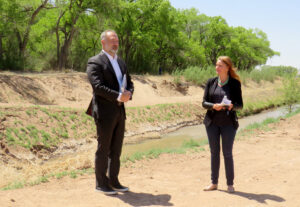Federal judge sides with Forest Service in Crazy Mountains access lawsuit

The federal magistrate judge considering a lawsuit over the Forest Service’s handling of access disputes in the Crazy Mountains has issued a preliminary order favorable to Forest Service leadership and landowners.
The plaintiffs, a consortium of sporting and conservation groups, sued the Forest Service in 2019 arguing that the agency has failed to maintain public access on trails traversing prescriptive easements in violation of its own policies and federal laws governing the agency’s conduct. Prescriptive easements, sometimes called historic or unperfected easements, involve right-of-way claims without an easement recorded on the deed. Prescriptive easements are common on Forest Service and Bureau of Land Management land, particularly in the West, where the expansion of railroads in the late 1800s left a legacy of checkerboard ownership that continues to complicate land management.
Judge Timothy Cavan sided with the Forest Service and area landowners in the Findings and Recommendations order he issued Friday, Feb. 18. The parties have 14 days to raise objections to the order, which will ultimately go to a more senior judge.
Cavan said the plaintiffs’ reference to federal laws governing the Forest Service’s conduct, including the Federal Land Policy and Management Act and the National Forest Management Act do not apply in the case because the government holds no claims on private property. He said the Forest Service has acted within its discretion in managing the four disputed trails, and that the plaintiffs’ claims were weakened by their failure to identify a “discrete agency action the Forest Service was required to take.”
The plaintiffs are Friends of the Crazy Mountains, Enhancing Montana’s Wildlife and Habitat, the Montana chapter of Backcountry Hunters and Anglers, and Skyline Sportsmen’s Association.
“We’re disappointed in the judge’s Finding and Recommendations. We respectfully disagree and we’ll be working on our objections over the next two weeks,” Enhancing Montana’s Wildlife and Habitat founder Kathryn QannaYahu Kern wrote in an email to Montana Free Press.
John Sullivan, board chair of the Montana chapter of Backcountry Hunters and Anglers, said he’s troubled by the order’s implications regarding the agency’s handling of other contentious issues. The decision allows the Forest Service to change long-held positions on things like public access to historic trails so long as the agency doesn’t codify the shift with an official policy or record of decision, he said. That effectively cuts public participation out of land management decisions, particularly if the “levers of the courtroom” aren’t a viable option to spur a review of agency actions, he said.
“If the Forest Service is allowed to ignore its own Travel Plan simply because it doesn’t make an official policy on it, that’s bad national policy,” Sullivan said. “I think it has some implications nationally.”
During a hearing last month, the Forest Service argued that though it once had a valid prescriptive easement interest in the contested trails, that interest has expired due to landowner efforts to block public access by putting up gates and no trespassing signs. (Montana law holds that prescriptive easement claims are no longer valid if public use of the trails lapses for five years.)
Matthew Bishop, a Western Environmental Law Center attorney representing the plaintiffs, said he’s concerned that Cavan’s opinion and the Forest Service’s handling of the disputed trails “sets a really bad precedent.”
“If the Forest Service doesn’t have an easement interest unless [it’s been] established by the court or recorded, then there are hundreds of trails, maybe more, that technically the Forest Service has no interest in,” he said. “This is just the tip of the iceberg.”
During a Jan. 18 hearing in Billings where both sides outlined their claims and answered questions posed by Cavan, Forest Service attorney Mark Smith said the agency has not made a broad policy change to its handling of historic trails and easement interests. The federal government must make those decisions on a “case-by-case basis,” he said.
The lawsuit was referenced during a Feb. 9 subcommittee meeting of the U.S. Senate Committee on Energy and Natural Resources.
“I continue to be concerned with what I think are inconsistencies in the Forest Service’s approach to public access,” Sen. Martin Heinrich, D-New Mexico, said during his questioning of Forest Service Deputy Chief Chris French. “These decisions affect access in every state in the nation.”
In response to an email about the order, Custer Gallatin National Forest Supervisor Mary Erickson said the matter is still in active litigation and she’s not at liberty to comment.
Both parties have 14 days from the issuance of Cavan’s Findings and Recommendations to object to the order. Bishop said the plaintiffs will file an objection, and he expects that the Forest Service will issue a response to that objection. Once that’s done, the matter will go before a more senior federal judge, Susan Watters, for review. Watters could take the case in a number of directions, Bishop said, including accepting Cavan’s recommendations, referring it back to Cavan for more fact-finding, or ordering a hearing.
“It’s not over yet,” Bishop said. “Judge Watters is going to review [the case] independently and without any deference to Judge Cavan’s recommendations, and that gives us hope.”
Watters had a more hands-on role early in the case when the plaintiffs sought an injunction to prevent the Forest Service from creating a new Porcupine Lowline Trail and obliterating portions of the existing trail. Watters sided with the government in her July 2019 decision, finding that the plaintiffs “did not raise serious questions going to the merits” and that the public would still be free to enjoy the same areas of the forest on the rerouted trail.
Portions of the new trail opened in 2019 and an official dedication ceremony took place last October.
This article was originally posted on Federal judge sides with Forest Service in Crazy Mountains access lawsuit







